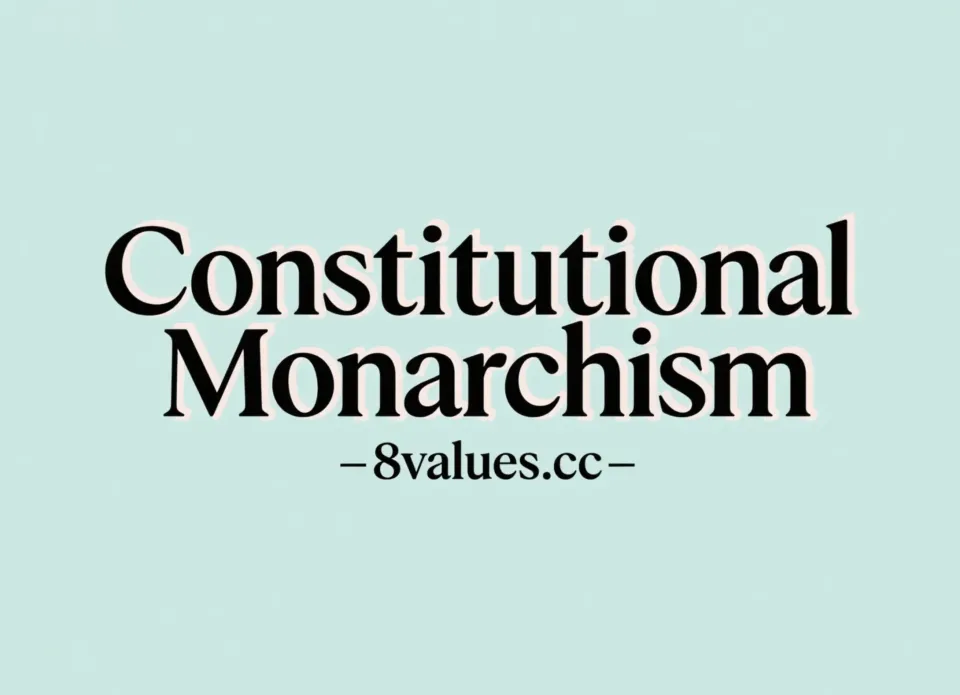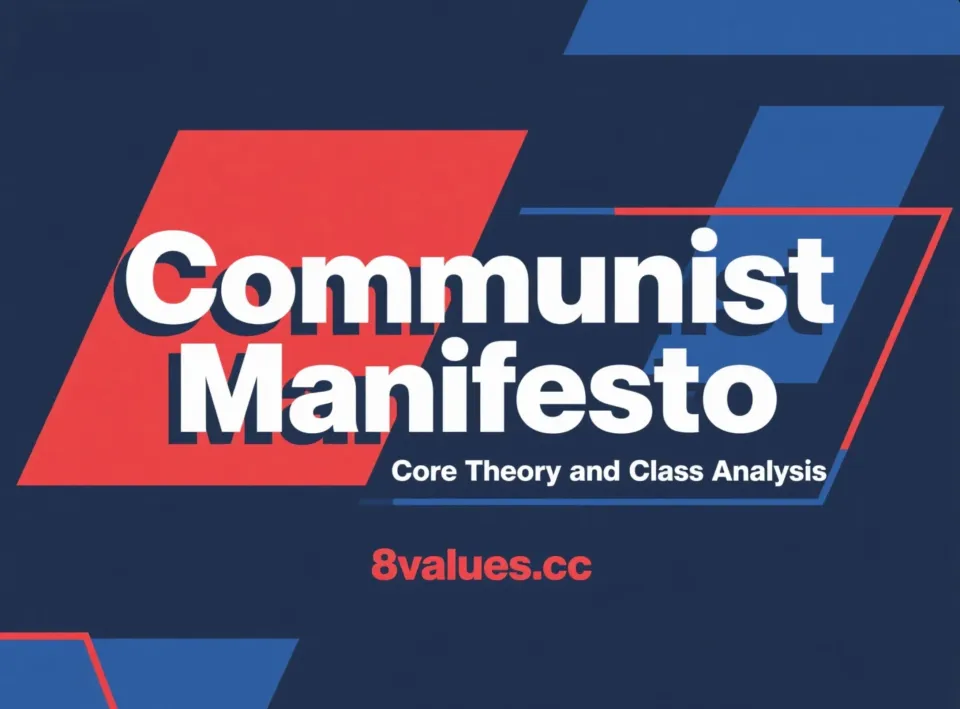Libertarian Socialism | 8values Interpretation of ideological ideology in political tests
Deeply explore the definition, core principles, historical evolution and contemporary practice of free will socialism. Understand how this unique political ideology that emphasizes individual freedom, social equality, workers’ autonomy and direct democracy distinguishes itself from other socialist schools and libertarianism. Through the 8values political values test, we can better understand the deep meaning of its anti-authoritative and anti-capitalist propositions.
Libertarian Socialism , as a unique political philosophy, aims to combine the pursuit of individual freedom and autonomy with a commitment to social and economic equality. It firmly opposes centralized state authority and capitalist exploitation structures, and instead advocates decentralized communities, direct democracy and collective ownership of means of production. This idea is regaining attention in the current world landscape as it seeks to address pressing issues such as economic inequality and concentration of power. If you are curious about the details of your ideological results in the 8 values political orientation test , or want to gain insight into the complexity of free will socialism , this article will provide you with a comprehensive interpretation.
The core concept of free will socialism: the integration of freedom and equality
The core of liberal socialism lies in its anti-authoritative stance and commitment to economic democracy . It not only pursues the maximization of personal freedom , but also strives to achieve social equality , believing that the two are interdependent and inseparable.
Anti-authoritative stance
Free will socialists view both state power and capitalist exploitation as a form of systemic oppression that restricts individual freedom. They believe that these forces are interrelated and together limit individual autonomy. Therefore, this idea emphasizes the emancipation from economic exploitation and political domination . Its anti-authoritative stance makes it reject all forms of social hierarchies , whether they are economically, politically, religiously or gender-based.
Economic Democracy and Collective Ownership
One of the core claims of this idea is the worker's control over production . It believes that the workplace should be owned and managed by the people who actually work there, ensuring that everyone has a say in how they operate. This means rejecting private ownership of productive assets and instead supporting a cooperative model. Libertarians believe that capitalism concentrates wealth and power in the hands of a few privileged classes because of its inherent inequality and injustice, leading to exploitation and oppression of the working class and prioritizes wealth accumulation rather than meeting the needs of all individuals.
Direct democracy and grassroots autonomy
In terms of political organizations, liberal socialism advocates direct democracy and grassroots participation . Decisions are made by people directly affected by them, usually through local councils or committees. This approach ensures that governance is participatory rather than representative. They pin their hopes on trade unions, workers' committees, grass-roots regimes , citizen councils and other decentralized means of direct democracy.
The value of mutual assistance and unity
Mutual assistance and solidarity are also the fundamental principles of free will socialism . It emphasizes that voluntary cooperation between individuals and groups is essential to building a healthy society, advocating for support and collaboration rather than competition. This is reflected in various practical applications today, such as workers’ cooperatives and community land trusts .
Distinguishing free will socialism: transcending traditional boundaries
What is unique about liberal socialism is its unique positioning, which is neither authoritarian socialism nor capitalist liberalism . Understanding these differences is essential to accurately understand their political spectrum location, and you can learn more about it on the 8values Political Spectrum Analysis page.
The fundamental difference from authoritarian socialism
Unlike authoritarian socialism, which usually relies on state control and central planning, liberal socialism firmly opposes state intervention and considers it oppressive. Libertarians believe that although all forms of socialist projects are based on the original intention of deconstructing hierarchy, realizing economic democracy and empowering the working class, the practice of authoritarian socialism will always backfire in the end because its theoretical premise cannot achieve true libertarian socialism . They believe that the state is a hierarchy that subordinates the working class to the “coordinator class” and ultimately leads to state capitalism .
Contrast with capitalist liberalism
Despite the similar names, liberal socialism is very different from capitalist liberalism (right). The latter emphasizes absolute personal freedom and minimal government intervention and supports private property and free markets. Liberal socialism criticizes the private property and wage system and advocates the socialization of means of production. Nom Chomsky argues that a consistent liberalist must oppose private ownership and wage slavery of means of production, because this does not match the principle that labor should be liberally borne and controlled by the producer.
Similarities and similarities with democratic socialism
There is some overlap in the goals of liberal socialism and democratic socialism , such as both pursuing social equality and economic democracy . However, democratic socialism often advocates achieving socialism through democratic election legislatures and gradual reforms, and accepts limited market mechanisms. Liberal socialism is more radical, tending to completely transform society through direct action and grassroots autonomy , and rejecting representative government and parliamentary politics as the main means to achieve socialism .
Historical origins and ideological contexts: The evolution of theory
Free will socialism did not happen overnight. Its ideas were rooted in the radical tradition of the Enlightenment and gradually took shape in the fierce debate between Marxism and anarchism .
The origin and evolution of the term "free will"
The term “libertarianism” originated in the 19th century and was derived from the French word “libertaire”, originally to circumvent France’s ban on anarchist publications. In the European socialist movement, it is often used to describe those who oppose state socialism , such as Mikhail Bakunin. However, by the mid-20th century, especially in the United States, the meaning of the word had undergone a fundamental change, borrowed by the right-wing liberalism concept to advocate laissez-faire capitalism and a wider private property rights. This historic appropriation has led to the seemingly contradictory rhetoric in the American context.
The Break of the First International: The Controversy between Marxism and Anarchism
As an independent political tendency, free will socialism was officially born in the breaking between anarchism and Marxism in the First International. The core of this break lies in fundamental differences over the role of the state. Mikhail Bakunin opposed Karl Marx's idea of "proletarian dictatorship", predicting that it would only create a new ruling class composed of a few privileged classes and use the state to oppress the working class. Bakunin believes that power is essentially corrupt and no matter who controls it, it will become a tool of oppression.
Key thinkers and their contributions
The treasure house of thought of free will socialism is constructed by many thinkers across different eras, including:
- Pierre-Joseph Proudhon : He put forward the famous assertion that "property is theft", but he also admitted that personal property can balance state power and protect personal freedom . His Mutualism conceives a form of property based on the legitimacy of labor.
- Mikhail Bakunin : One of the main founders of collective anarchism, whose core of his thoughts is absolute personal freedom and a complete denial of all authority.
- Peter Kropotkin : He regards the state as an inherent tool of landlords and capitalism, and therefore should oppose the state as firmly as he opposes capitalism.
- Noam Chomsky : A well-known contemporary liberal socialist who applied this idea to criticism of modern state power, corporate power, and the mass media.
- Georges Sorel : Anarchist Marxist syndicalist in France, whose thoughts combine Marxist social and historical analysis with anarchist political practice, emphasizing the importance of workers' self-liberation .
- William Morris : Developed a kind of free will socialism based on a strong critique of civilization.
- Murray Bookchin : a famous communist whose vision of denationalized networked autonomous communities influenced Rojava's democratic confederacy practice.
The Practice of Liberal Socialism: From History to Contemporary
Free will socialism is not only a theory, but also leaves a profound practical imprint in history and the contemporary world, exploring the possibility of stateless social and economic democracy .
Revolutionary attempts and historical cases
Historically, the idea of free will socialism has been practiced at several important revolutionary moments:
- Paris Commune (1871) : As one of the earliest attempts to self-governance by workers , the commune achieved direct democracy and collective ownership , providing important inspiration for the later free-will socialist movement.
- Spanish Civil War (1936-1939) : During the Spanish Revolution, especially in anarchist strongholds such as Catalonia, up to 75% of the economy was placed under the control of workers . The factory is managed by the workers' committee , the rural areas are collected and operated as a free-will socialist commune . These practices have proved that a decentralized economic system is feasible without state or capitalist supervision.
- Hungarian Revolution of 1956 : During this revolution, ordinary workers attempted to overthrow the government and establish direct democracy in the form of workers’ committees .
Contemporary Autonomy Practice and "Dual Power"
Unlike the failure of the Spanish Revolution, the practical exploration of contemporary liberal socialism provides a more pragmatic survival strategy, turning to building independent communities in specific regions and exploring the " dual power " model that coexists with existing countries.
- Zapata National Liberation Army (EZLN) : The EZLN in Chiapas, Mexico is described as a free will socialist or anarchist group. Instead of seeking to completely overthrow the Mexican government, they have established a de facto autonomous governance system in areas where the state is weak.
- Rojava : The “Rojava” in northeastern Syria (now known as the “Northern and Eastern Autonomous Government of Syria”) is practicing a model called “Democratic Confederacy” that was inspired by the free will socialist thinker Murray Bookchin. It emphasizes grassroots democracy , decentralization, women's liberation and the sharing economy.
Challenges and Criticism: The Tension of Ideals and Realities
Although free will socialism has lofty ideals and certain practical results, it also faces severe challenges and criticism from all parties.
"Contradictory" accusations
Free will socialism is often criticized as an ideology of "oxymoron". Critics argue that it is impossible to choose between a country with full property control and a state that does not exist at the same time. The dictionary definition itself reveals the problem: liberalism advocates minimal state intervention, while socialism advocates that the means of production are owned or managed by the entire community. How can these two determine ownership without some kind of power structure?
Questions about feasibility, coordination and efficiency
Critics argue that decentralized systems may face difficulties in coordinating at scale or defending against external threats and question their economic efficiency . Some traditional Marxist scholars believe that liberal socialism rejects vanguard leadership and state power, making it unable to effectively cope with the consolidation of counter-revolutionary forces, resulting in its projects prone to collapse or exploitation.
The debate between utopia and pragmatism
Some critics point out that liberal socialism is too idealistic and may be overly reliant on optimistic assumptions about solidarity in the post-revolutionary period of humanity. When faced with the question of how to prevent individuals from re-establishing private businesses, free will socialists may not be able to avoid some form of governance to ensure private ownership does not appear again.
The contemporary significance of free will socialism
Despite the challenges, liberal socialism still has important significance and revelation in today's world.
Inspiration for future social construction
Liberal socialism provides a framework for transcending traditional divisions and rethinking political and economic systems. It challenges the capitalist structure that concentrates wealth and the authoritarian model that limits individual freedom . By combining social ownership with individual freedom , this ideology provides a coherent approach to building a more equitable society. It extends beyond the economic field, advocates social and cultural liberation and focuses on issues related to gender, race and other social divisions.
8values Political testing and self-exploration
If you have a deeper understanding of the complex ideas of free will socialism and its place on the political spectrum , you might as well explore your political ideology through the 8values Political Position Test and see all 8values results and our blog posts for more professional interpretations. This self-exploration not only helps clarify personal positions, but also prompts us to think about how to jointly contribute to a more free, equal and just society in a complex and changeable world.






